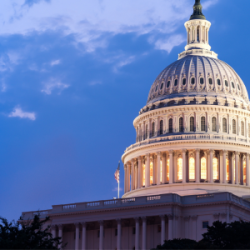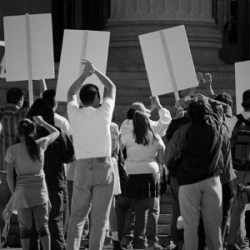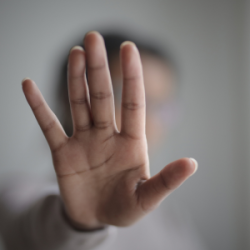Welcome readers! Please subscribe through the buttons at the right if you enjoy this post.

In Luke’s gospel we read, “The teachers of the law and the chief priests looked for a way to arrest him immediately, because they knew he had spoken this parable against them. But they were afraid of the people. Keeping a close watch on him, they sent spies, who pretended to be sincere. They hoped to catch Jesus in something he said, so that they might hand him over to the power and authority of the governor.” (Luke 20:19-20)
This passage juxtaposes the mass of Jewish people who favored Jesus, the elites in that society who were threatened by Jesus’ populist teachings, and Roman power and authority. The reference to the authority of the governor is a political story detail through and through. The story reminds us of how those in positions of power and privilege use the power of the state to protect their own social position, especially when their agenda is contrary to the masses’.
For those who have been reading this month’s book of the month for RHM, A History of the World in Seven Cheap Things: A Guide to Capitalism, Nature, and the Future of the Planet by Jason W. Moore and Raj Pate, you’ve read how historically our capitalist society has not been based on equality, win-win, and cooperation, but on competition, inequity, and the kind of “winning” that requires someone somewhere else to lose. The economic and political elite has continually used the power of the state to accomplish their goals. In Luke, this method is chosen because the elite “fears the people.”
Jesus’ teachings are represented here as being popular among the people. The elite does not have the people’s best interest in mind, but looks for how best to manipulate them and preserve the status quo. Jesus was popular with large sectors of the have-nots in the story: the haves have always used the system’s “authority” to preserve themselves.
In a more just and compassionate structure the state could protect the vulnerable from being exploited by the powerful and privileged. Yet the times when there has been a more regulatory form of state power on the side of the masses have been the exception to the history of state power in capitalist/colonialist society, not the rule.
As long as we have classes and other social locations where some have power and others don’t, the state should protect the vulnerable. I think of the words of Dr. Martin Luther King, Jr. in a talk he gave at Western Michigan University in 1963: he spoke against the idea that the power of the state is useless in our work toward a just society:
“Now the other myth that gets around is the idea that legislation cannot really solve the problem and that it has no great role to play in this period of social change because you’ve got to change the heart and you can’t change the heart through legislation. You can’t legislate morals. The job must be done through education and religion. Well, there’s half-truth involved here. Certainly, if the problem is to be solved then in the final sense, hearts must be changed. Religion and education must play a great role in changing the heart. But we must go on to say that while it may be true that morality cannot be legislated, behavior can be regulated. It may be true that the law cannot change the heart but it can restrain the heartless. It may be true that the law cannot make a man love me but it can keep him from lynching me and I think that is pretty important, also. So there is a need for executive orders. There is a need for judicial decrees. There is a need for civil rights legislation on the local scale within states and on the national scale from the federal government.” (Martin Luther King, Jr., Western Michigan University, December 18, 1963)
When we consider the “authority of the governor” in our passage this week, it was not on the side of the people, but contrary to the will of the people, within the context of the conflict between Jesus and the political elite of his day.
I want to stop here and ask you to dream with me for a moment . What is your image of a perfect world? I’m not saying the world will ever be perfect. The exercise of dreaming about what a perfect world would be though is a practice that helps us in our work of moving toward a world that is less unjust, less exploitative, less unsafe.
Does your image of a perfect world include the need for the vulnerable to be protected from the strong? Or does your image of a perfect world make even this obsolete? Is your image of a perfect world one where some take responsibility for caring for those who are vulnerable?
Jesus envisioned a world where even the meek inherit the earth.
“And there arose also a dispute among them as to which one of them was regarded to be greatest. And He said to them, “The kings of the Gentiles lord it over them; and those who have authority over them are called ‘Benefactors.’ But it is not this way with you, but the one who is the greatest among you must become like the youngest, and the leader like the servant. For who is greater, the one who reclines at the table or the one who serves? Is it not the one who reclines at the table? But I am among you as the one who serves.” (Luke 22:24 -27)
Jesus here contrasts systems of dominion and systems of service. Humanity’s hope for the future is not in devising more efficient ways of dominating one another, but in creating more effective ways of caring for one another.
The tragedy is when those who claim to represent Jesus today use the same method as is in our original story in Luke 20. Privileged and powerful Christian Evangelicals view Trump as their Messiah because he will enforce their political agenda. At the foundation of this delusion is the Christian Right’s long struggle to overturn Roe vs Wade, the law that affirmed legal access to a safe abortion. Just this week, someone commented on a post of mine that if Planned Parenthood was defunded it would protect “thousands” of lives of the vulnerable.
“Vulnerable?” I thought. I assumed they were speaking of the unborn. But what about the vulnerability of women, especially those in a certain social location, who will die as a result of overturning Roe vs. Wade? Those who are informed understand that lowering abortion rates has nothing to do with the legality of abortion. It does have to do with the availability of education and birth control, and child and youth advocacy. Abortions have actually increased when outlawed. In the end, this is yet another example of those in power, mostly men, using state power to control the lives and bodies of women who should have autonomy over their own bodies. Pro-choice is not pro-abortion. There are genuinely effective ways of lowering the rate of abortions in society that do not escalate the fatality rate for women nor seek to remove women’s bodily autonomy. (For more see How I Lost Faith in the “Pro-Life” Movement)
Since Trump’s election, we have seen a surge in Evangelical, American Christianity’s desire to influence our state and federal governments to enforce its dogmas under the misapplied label of “religious freedom.”
Here in West Virginia, we are in the midst of a battle over education, where for-profit charter schools are using Christians as pawns. I understand that some nonprofit charter schools have been a tremendous help to some minority Black and Brown communities. That’s not what is happening here. Christians are lifting their voices alongside for-profit corporations against what the majority of “the people” here in WV want. These Christians want to use the power of the state to protect them from the fear that they will have to send their children to public schools where they will sit in a classroom beside nonwhite, migrant, Muslim and LGBTQ kids.
Christianity has a long history of being on the wrong side of the use of state power. On October 28, 312 C.E., Constantine defeated his rival to become sole ruler of the Roman Empire. Constantine attributed his victory to Jesus Christ. He allegedly received a vision just prior to the battle that promised him victory if his soldiers marched with the sign of Christ on their shields. It was the first time in history that the name of Jesus was aligned with the nationalistic, violent power of the state. This set a precedent and Christianity’s social location changed dramatically to make it the official state religion. Eusebius, Augustine, and other church leaders interpreted Constantine’s vision and the consolidation of power that his victory engendered to be from God. The power of the state has been used for centuries to crush Christianity’s enemies to exploit and/or execute heretics, Jews, Muslims, women accused of “witchcraft,” indigenous populations, those whom we today identify as LGBTQ, and more.
Today, certain Christians are still trying to use the power of the state, not to side with the people and protect the vulnerable, but, sometimes ignorantly, sometimes knowingly, to push their own agenda regardless of the real harm such actions do to real people.
As long as there is a state, it should side with the vulnerable against those who would seek to do harm. Christians must choose to learn from their destructive history. The Jesus story calls us to side with “the people,” not the agendas of the powerful, privileged, and elite.
A misuse of the power of the state executed Christianity’s Jesus.
And misuse of the power of the state is still harming the most vulnerable groups today.

















